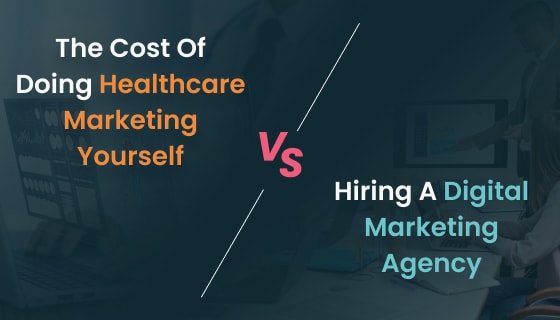In today’s digital healthcare landscape, where patients turn to websites for information, support, and care, HIPAA compliance isn’t just a “nice-to-have”—it’s a vital promise to patients. A HIPAA-compliant website tells patients, “We value your privacy as much as you do.” It’s about building trust and accountability, and ultimately, it’s about taking responsibility for every interaction with patient data. So, let’s dive into how to make this compliance a reality for your healthcare website, starting with a crucial question:
Does your website need to be HIPAA-compliant?
Is HIPAA Compliance Necessary For Your Website?
Determining whether your website needs to be HIPAA compliant depends on the type of data it collects and how it handles it.
Does your website handle Protected Health Information (PHI), such as medical records, treatment plans, or patient information? If so, it likely falls under HIPAA’s scope. This includes sites like healthcare provider portals, telemedicine platforms, and health insurance websites.
Even if your site doesn’t directly handle PHI, do you work with covered entities, such as healthcare providers? If yes, you may still need to comply with certain aspects of HIPAA as a business associate.
If your site only provides general health information or non-PHI services, HIPAA compliance may not be necessary. However, conducting a thorough assessment and consulting legal experts is essential to ensure you meet all requirements and avoid potential liabilities associated with healthcare data.

Understanding HIPAA’s Role In The Digital Age
The Health Insurance Portability and Accountability Act (HIPAA) is a federal law designed to protect sensitive patient health information. It applies to healthcare providers, health plans, healthcare clearinghouses, and other entities handling patient data, including insurance companies and similar organizations.
For websites, HIPAA compliance ensures that patient health information collected, stored, or transmitted is kept secure and private. This includes personally identifiable information (PII), such as names, addresses, phone numbers, and medical details.
HIPAA-compliant websites often incorporate key features to uphold security and privacy standards, such as:
- Encryption of patient data both during transmission and while stored.
- Access controls and user authentication protocols.
- Regular security risk assessments and vulnerability testing.
- Policies and procedures for responding to data breaches and security incidents.
- Business associate agreements with third-party vendors or service providers handling patient information.
Maintaining a HIPAA-compliant website for healthcare providers is crucial for protecting patient data and avoiding potential legal and financial repercussions.
Quick Fact: Did you know that HIPAA was enacted in 1996—before the rise of modern websites? Yet, its core principles remain highly relevant, emphasizing data protection and patient privacy in all healthcare interactions.
Patient Trust And HIPAA Compliance: A Digital Foundation
HIPAA Builds Trust In The Digital Age
In a time of unprecedented data breaches and cyber threats, patients are more cautious than ever about sharing personal information online. Patients interacting with your website look for information and assess whether their privacy will be safeguarded. A HIPAA-compliant website signals a commitment to protecting their health information, building a foundation of trust that goes beyond simple data collection.
A secure, compliant website offers reassurance by showing patients that:
- High-Security Standards: Encryption, access controls, and secure storage reassure patients that their sensitive information is safe.
- Commitment To Privacy: HIPAA compliance includes transparent privacy policies, user consent, careful data handling, and showing patients that their privacy is a priority.
- Building Trust: While trust takes time, HIPAA compliance is a crucial first step. Patients who value this commitment are more likely to engage with your digital services and build loyalty to your brand.
Why It Matters: When patients feel confident that their health information is handled securely, they’re more likely to engage openly with healthcare providers online. HIPAA compliance helps establish trust by showing patients that your organization prioritizes their privacy and security, encouraging them to use digital health services, and fostering long-term loyalty.
The Hidden Risks Of Non-Compliance
Unseen Threats To Data Security
While most healthcare websites recognize the need for HIPAA compliance, many overlook the less visible or evolving risks that can pose significant security threats. Beyond standard encryption and access controls, modern digital threats require constant vigilance and proactive defenses. Commonly overlooked risks include:
- Unauthorized Data Access: As cyber threats become more sophisticated, unauthorized access isn’t always apparent. It can stem from weak passwords, unmonitored third-party access, or employees unintentionally sharing information.
- Outdated Security Practices: Legacy systems and outdated security protocols can create vulnerabilities, making it easier for cyber attackers to exploit weak points. As new attack methods emerge, outdated software or security methods may not be sufficient to protect against evolving threats.
- Phishing And Social Engineering: Cybercriminals increasingly use social engineering techniques to manipulate employees into divulging sensitive information. Staff can easily fall victim to phishing attacks without regular training, which opens access to critical systems and data.
Addressing Compliance Gaps: Potential Consequences
Sometimes, minor oversights—such as failing to update security settings regularly or overlooking emerging vulnerabilities—lead to the most severe outcomes. When these gaps in compliance go unnoticed, healthcare providers unintentionally leave their websites open to data breaches. The consequences of these breaches can range from costly legal ramifications to the loss of patient trust, which can be difficult for any organization to recover from.
The consequences of these compliance gaps can be severe:
- Costly Fines And Legal Actions: Regulatory bodies impose significant fines for HIPAA violations, particularly when negligence is demonstrated. These costs can be financially devastating for healthcare providers, mainly if they result from repeated compliance issues.
- Loss Of Patient Trust: Data breaches erode patient trust, and rebuilding this trust can be challenging and costly. Patients expect their information to be protected, and breaches can lead to hesitation in sharing necessary information, reduced engagement with online services, and even patient attrition.
- Reputational Damage: A breach or compliance failure can attract unwanted media attention, damaging an organization’s reputation. Recovering from reputational harm often requires extensive public relations efforts and patient reassurance, which can be costly in both time and resources.
Tip: Conduct periodic audits to ensure compliance at every level, from technology to staff training. Regular updates and proactive adjustments to security measures help prevent gaps that could lead to costly consequences.
Future-Proofing Your Website For HIPAA
- Perform Routine Security Assessments: Regular vulnerability scans, such as penetration tests and scheduled audits, help identify potential risks and keep your system secure.
- Enable Real-Time Monitoring: Set up automated monitoring tools to immediately detect and alert you to suspicious activity, allowing quick responses to threats.
- Apply Timely Software Updates: Regularly install security patches and updates to maintain infrastructure strength against new cyber risks.
- Adapt Policies And Procedures: Regularly review and update your data protection policies to address emerging threats and evolving technology needs.
Key Takeaway: Future-proofing HIPAA compliance requires a proactive, continuous approach. Routine audits, real-time monitoring, and adaptive security practices help your website remain resilient and compliant despite evolving cyber threats.
HIPAA Compliance Checklist: Crucial For Healthcare Websites
| Category | HIPAA Compliance Checklist |
| Website Security Measure | HTTPS & SSL Secure Forms Vulnerability Testing Data Minimization |
| Data Protection | PHI Encryption Secure & HIPPA Compliance Hosting |
| Access Control | Privacy Policy Patient Rights |
| Risk Assessment | Risk Assessments Mitigation Strategies |
| Incident Responses | Breach Notification Plan Incident Response Procedure |
| Website Accessibility | Accessibility Compliance User Experience |
| Monitoring & Auditing | Regular Security Audits Access Logs |
| Vulnerability Testing & Data Disposal | Security Testing Software Updates Data Disposal |
Benefits Of A HIPAA-Compliant Website For Healthcare Brands
More Than Just Compliance—A Strategic Advantage
Meeting HIPAA standards safeguards your organization from potential penalties and positions your brand as a trusted leader in patient care. In an era where privacy concerns are paramount, a HIPAA-compliant website reinforces your commitment to safeguarding patient data, building credibility, and strengthening patient loyalty.
By investing in robust data protection, you’re signaling to patients that their privacy matters to you—making it more likely they’ll choose your services over others. This strategic focus on security transforms compliance into a distinct advantage that resonates with today’s privacy-conscious patients.
Conclusion
In today’s digital healthcare landscape, where patients increasingly rely on online interactions, a HIPAA-compliant website is crucial—not only for regulatory compliance but also for building trust, transparency, and peace of mind. Each security measure, from encryption to access controls, conveys a dedication to patient privacy. This trust is earned through consistent, proactive steps that reflect a commitment to safeguarding sensitive data.
HIPAA compliance is an ongoing journey that requires vigilance, adaptability, and continuous improvement. As healthcare organizations evolve alongside digital advancements, maintaining compliance helps them stay resilient against risks, address emerging threats, and uphold robust security practices.
For healthcare providers aiming to strengthen their digital presence, ZealousWeb offers guidance and solutions to implement HIPAA-compliant websites that meet essential privacy and security standards. Connect with us to learn more about how ZealousWeb can support your HIPAA compliance journey and help you build a secure, trusted platform for patient care.














